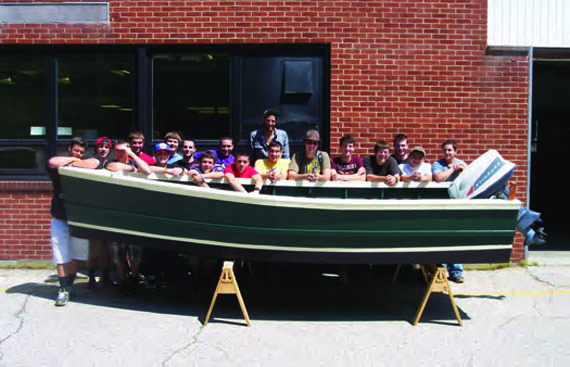by CYNTHIA GOSS
When the Rhode Island Marine Trades Association (RIMTA) received word of winning a grant from the Governor’s Workforce Board RI to launch a Marine Trades Pre-Apprenticeship Program, it was cause for celebration. The $142,788 grant was good news for career-seekers who now have a clear pathway to training for entry-level jobs; it was also welcome news for employers who will now have a source for workers with basic skills who can grow into star employees.

Students in the Tiverton High School marine-trades program show off a 16-foot skiff that they built. © rimta.org
But if you look at the broader picture of what is happening in marine-trades training in Rhode Island, the news of this pre-apprenticeship program is deeper than cause for celebration. It will help transform how the state’s boating workforce is built.
This spring, the Rhode Island State Apprenticeship Council recognized the model for the Rhode Island Marine Trades Apprentice Program, developed at Hinckley Yachts in Portsmouth. This program is the next step for pre-apprentices or for those with a solid foundation of skill, such as grads of the International Yacht Restoration School (IYRS) or the New England Institute of Technology (NEIT), who want to apprentice with master journeymen. The state also has high school programs in marine technology that are attracting young people who are excited about working around boats.
Rhode Island now has an entire ladder of career training programs. But if this series of programs were a tree, the High School programs would be the roots. By working with local marine companies and exposing students to different areas of the field, these high school programs are giving young Rhode Islanders a glimpse at their own futures by showing them what is possible with hard work and a passion for boats.
A Leader in HS Career Tech
Rhode Island has become a leader in marine trades career tech programs for high school students, thanks in part to two impassioned instructors who helped write a curriculum with the American Boat & Yacht Council (ABYC), which can now be adopted by schools in other states.
Michael Jarret, instructor at Chariho Career and Technical Center, and Chris Bianco, instructor at the Warwick Area Career and Technical Center, both run marine technology programs at their respective schools. These are three-year programs, and students enter in the sophomore year. Students spend the first 1.5 years getting a broad introduction to the industry through 14 modules, including boat design and construction, fiberglass construction and repair, engine mechanics (outboard, inboard and inboard/outboard), welding and metalworking, marine systems, wood joinery and finishes, and other areas. After completing these modules students specialize by doing their own project. Some gravitate to welding and metalwork; one student is refitting an O’Day Javelin; others are building skiffs or rebuilding outboards.
Building Boats in Tiverton
When word started getting out about the sturdy 16-foot wooden skiffs being built at Tiverton High School, a line of buyers started to form. According to Bill Phillips, technology education teacher at Tiverton who runs the school’s marine-trades program, these flat-bottom boats are perfectly suited to the nearby Sakonnet River and were used in the 1970s and ‘80s for quahogging.
The deep interest from the local community in owning these student-built boats was one surprise outcome of the four-year-old program. The other, according to Phillips, is how much this program has been embraced by the local marine industry. “I can’t believe how much the doors have opened for us,” says Phillips. Local marine companies have talked with students, invited them to tour their operations, and been generous with their expertise.
The Tiverton program follows a different curriculum from the two career-tech programs. Students hone their hands-on skills by building the skiffs. They also learn about the industry through talks with local business owners and field trips. RIMTA is helping Phillips roll his program into a six-week summer program. Several students in all programs have secured internship and work-and-learn opportunities in the marine trades.
Opening Up New Horizons
When students graduate from all three programs, they take a variety of routes. Some continue to get schooled at places like MTTI, NEIT and IYRS; some attend maritime academies; some go right into the workforce. The new Rhode Island Marine Trades Pre-Apprenticeship Program will be a huge open door for students who do not want to continue in school but will benefit from the program’s 205 hours of training to round out their skills.
All three instructors may be teaching students valuable hands-on skills. But the real work of these instructors is giving students an introduction to new possibilities for their futures.
“The really exciting part,” says Jarret, “is seeing what students decide to do after the program. Before entering the program, they have no idea of the breadth of the marine-trades umbrella. When they leave the program, many go in a direction they never even knew existed.” For more information about these training programs, contact RIMTA at info@rimta.org.




